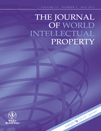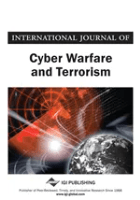
Journal of World Intellectual Property
Scope & Guideline
Driving Conversations on the Evolution of Global IP Rights
Introduction
Aims and Scopes
- Intellectual Property Law and Policy:
The journal explores key issues within intellectual property law, including copyright, patents, trademarks, and geographical indications, emphasizing their legal frameworks, challenges, and evolutions. - Global Perspectives on IP:
It offers insights into how different countries and regions approach IP protection, examining case studies and comparative analyses that highlight variations in legal practices and their socio-economic impacts. - Interdisciplinary Approaches:
The journal encourages interdisciplinary research that integrates economics, technology, culture, and public policy, particularly in the context of emerging technologies and societal changes affecting IP. - Innovation and Development:
A significant focus is on the relationship between IP rights and innovation, especially in sectors like biotechnology, pharmaceuticals, and digital content, analyzing how IP can foster or hinder development. - Traditional Knowledge and Cultural Expressions:
The journal addresses the protection of indigenous rights and traditional knowledge, discussing the importance of preserving cultural heritage through appropriate IP frameworks.
Trending and Emerging
- Impact of Technology on IP:
There is a growing focus on how advancements in technology, particularly artificial intelligence and blockchain, are reshaping intellectual property management and protection, indicating an urgent need for adaptive legal frameworks. - IP and Public Health:
Research surrounding the intersection of intellectual property rights and public health, especially in the context of the COVID-19 pandemic, has surged, highlighting the critical role of IP in vaccine distribution and access to medicines. - Sustainable Development and IP:
Emerging themes emphasize the relationship between intellectual property rights and sustainable development, particularly in agricultural biotechnology and traditional knowledge, suggesting a shift towards more socially responsible IP practices. - Open Innovation and Collaboration:
The concept of open innovation is gaining traction, examining how collaborative models can enhance innovation while respecting IP rights, especially in sectors like biotechnology and digital content. - Ethics in IP Law:
There is an increasing emphasis on ethical considerations within intellectual property law, particularly regarding the protection of cultural heritage and traditional knowledge, reflecting a broader societal push for ethical governance.
Declining or Waning
- Traditional Copyright Issues:
There has been a noticeable decline in discussions specifically centered on traditional copyright issues, such as basic copyright infringement cases, as the focus shifts towards more complex challenges posed by digitalization and new technologies. - Geographical Indications in Developed Countries:
The emphasis on geographical indications (GIs) in developed countries has waned, with more recent publications prioritizing discussions on GIs in developing nations and their role in economic development. - Static Patent Law Analysis:
Static analyses of patent law without consideration of innovation dynamics are becoming less prominent, as the journal increasingly emphasizes the interaction between patent law and emerging technologies. - Historical Context of IP Laws:
Research focusing solely on the historical development of IP laws, without linking them to current challenges and future implications, appears to be decreasing in favor of more contemporary analyses. - Regional IP Treaties:
The coverage of regional IP treaties has seen a decline, as the journal shifts towards a broader examination of global IP standards and practices rather than focusing on specific treaties.
Similar Journals

PRZEMYSL CHEMICZNY
Connecting Researchers to Transform Chemical PracticesPRZEMYSL CHEMICZNY is a distinguished journal published by WYDAWNICTWO SIGMA-NOT SP ZOO, operating out of Poland since its inception in 1973. This periodical serves as a vital platform for disseminating innovative research in the realms of Chemical Engineering and Chemistry, albeit currently categorized in the Q4 quartile, indicating opportunities for growth and development within these fields. Despite its challenges, the journal showcases a diverse array of scholarly works, providing insights that are crucial for advancing knowledge and practices in chemical sciences. The journal is recognized for promoting research collaborations and fostering discussions among researchers, professionals, and students who are keen on exploring the intricacies of chemical processes and engineering applications. Although it does not currently offer open access, PRZEMYSL CHEMICZNY remains an essential resource for academics and professionals navigating the complexities of the chemical industry. For those interested in contributing or accessing research, the journal continuously encourages submissions and engagement from the community, highlighting its commitment to the progressive development of chemical research.

HARVARD LAW REVIEW
Advancing the Boundaries of Legal Knowledge.HARVARD LAW REVIEW, an esteemed publication by the Harvard Law Review Association, stands as a cornerstone of legal scholarship in the United States, boasting an impressive ISSN of 0017-811X and E-ISSN 2161-976X. Renowned for its rigorous editorial standards and comprehensive analyses, this journal occupies the prestigious Q1 category in Law, ranking #149 out of 1025 in Scopus, which places it in the 85th percentile among its peers in the Social Sciences Law category. With a publication history stretching from 1973 to 2024, it consistently features groundbreaking articles, influential essays, and critical commentaries that shape contemporary legal thought. Although not an open-access journal, HARVARD LAW REVIEW remains indispensable for researchers, professionals, and students who seek to engage deeply with the evolving landscape of law. Its rigorous academic focus empowers scholars and practitioners alike, making it a vital resource in the field.

International Journal of Cyber Warfare and Terrorism
Fostering Innovation in Cybersecurity ScholarshipThe International Journal of Cyber Warfare and Terrorism is a critical resource for researchers, professionals, and students exploring the multifaceted domains of cybersecurity, warfare, and the implications of digital terrorism. Published by IGI Global, this journal provides a platform for innovative and interdisciplinary research, contributing significantly to the understanding of current challenges in the digital landscape. With an ISSN of 1947-3435 and E-ISSN 1947-3443, the journal covers a range of essential categories, including Computer Networks and Communications, Hardware and Architecture, and Information Systems Management, reflecting its commitment to addressing urgent issues in computer science and safety research. Though currently categorized in Q4 of multiple scientific sectors, the journal stands as a beacon for emerging scholarly thought and practical applications in combating cyber threats and enhancing digital resilience. While the journal is not open access, its findings are crucial for academic discourse and policy-making in an increasingly interconnected world, making it a valuable asset for anyone involved in the study of cyber threats and defenses.

NTUT Journal of Intellectual Property Law and Management
Empowering Insights in Intellectual Property ManagementNTUT Journal of Intellectual Property Law and Management is a prominent academic platform published by NATIONAL TAIPEI UNIVERSITY OF TECHNOLOGY, focusing on the critical intersection of intellectual property law, business strategy, and management practices. Established in 2012, this journal disseminates research aimed at enhancing the understanding and management of intellectual property rights, particularly within the dynamic landscape of Taiwan and beyond. Although it is classified within the Q4 quartile across diverse categories such as Business and International Management and Law, this journal remains an essential resource for those seeking insights into contemporary issues and developments within the field. Researchers and practitioners alike will find value in its contributions, which are crucial for navigating the complexities of intellectual property in today’s global economy. While currently not offered as open access, the journal aims to foster scholarly discussion that can drive innovation and protect intellectual creativity. With its continuing commitment to academic rigor and relevance, the NTUT Journal stands as a vital resource for anyone engaged in intellectual property law or management.

AMERICAN BUSINESS LAW JOURNAL
Illuminating the Complexities of Business RegulationAmerican Business Law Journal, with ISSN 0002-7766 and E-ISSN 1744-1714, is a prestigious publication by Wiley that has been at the forefront of legal scholarship since its inception in 1963. Published in the United Kingdom, this journal serves as a vital resource for understanding the intersection of business and law, providing a platform for rigorous academic research, case studies, and theoretical discussions. The journal boasts a commendable impact factor, ranking in the Q2 category for Law and Q3 for Business and International Management, indicating its importance in the field. With its position in the Scopus database, ranking #435 in Law and #364 in Business and International Management, American Business Law Journal is well-regarded by researchers and practitioners alike. Although it does not offer open access, the journal remains an essential tool for scholars and students keen on exploring the complex regulatory landscapes that shape the business environment. Readers can expect valuable insights and innovative approaches from this influential journal as it navigates the evolving challenges and opportunities in business law through to 2024 and beyond.

INDIANA LAW JOURNAL
Championing Innovative Legal ScholarshipINDIANA LAW JOURNAL, a premier publication in the field of law, serves as a vital platform for scholarly discourse and legal scholarship. Established in 1973 and originating from the Indiana University School of Law in Bloomington, this esteemed journal publishes a diverse range of articles, essays, and commentary from both established and emerging legal scholars. With an impressive Scopus Rank of #350 out of 1025 in the Social Sciences domain, placing it in the 65th percentile, the journal is recognized for its contributions to the legal academic community. Its 2023 category quartile ranking of Q2 underscores its significance and relevance, ensuring that published works are widely acknowledged and cited. Although not an open access journal, the INDIANA LAW JOURNAL is committed to fostering robust academic exchanges and enhancing understanding in various legal fields, making it an indispensable resource for researchers, professionals, and students alike. With a history of convergence in publication timelines, it continues to evolve in response to the continually changing legal landscape.

MINNESOTA LAW REVIEW
Cutting-edge Insights into Contemporary Legal IssuesMINNESOTA LAW REVIEW is a prestigious academic journal dedicated to advancing legal scholarship and discourse, published by the MINN LAW REVIEW FOUND in the United States. Established in 1976, this journal has become a cornerstone in the field of law, achieving an impressive Q1 ranking in the Law category for 2023, underscoring its significance and influence in legal studies, with a Scopus rank placing it in the 65th percentile among social sciences law journals. The ISSN number for both print and electronic editions is 0026-5535, ensuring broad accessibility to its scholarly contributions. With a commitment to publishing innovative and analytical articles that address contemporary legal issues, the MINNESOTA LAW REVIEW serves as an essential resource for researchers, students, and legal professionals seeking to deepen their understanding and engage with critical legal concepts. While it does not currently provide open access, its wide array of topics spans various disciplines within law, fostering a vibrant academic community dedicated to the exploration of legal principles and their applications. The journal’s editorial office can be found at 229 19TH AVE SOUTH, UNIVERSITY OF MINNESOTA, MINNEAPOLIS, MN 55455, where a team of experts curates content that reflects the evolving landscape of legal thought.

NOTRE DAME LAW REVIEW
Advancing Legal Scholarship Since 1926NOTRE DAME LAW REVIEW is a premier scholarly journal published by Notre Dame Law School, renowned for its rigorous examination and commentary on legal issues and the evolving jurisprudence of the United States. Established in 1926, the journal has become a vital resource for legal scholars, practitioners, and students, consistently earning a reputation for excellence as evidenced by its Q1 category classification in Law for 2023. With a solid ranking within the Scopus Social Sciences index, placing at #413 among 1025 journals, it captures significant contributions to legal scholarship, making it an essential part of any legal researcher's library. Though it does not currently offer open access options, the journal's impact is underscored by its rich history and commitment to advancing legal discourse. Scholars looking to stay abreast of the latest legal developments and analyses will find NOTRE DAME LAW REVIEW an indispensable tool for their research and practice.

SYDNEY LAW REVIEW
Fostering Critical Dialogue in Legal StudiesSYDNEY LAW REVIEW is a prestigious academic journal published by the Sydney Law School, dedicated to the field of legal studies and interdisciplinary analysis of law and its impact on society. With its ISSN 0082-0512 and E-ISSN 1444-9528, this journal serves as a vital resource for legal scholars, researchers, and practitioners in Australia and globally. The journal has undergone several phases since its inception in 1990, reflecting the evolving landscape of legal scholarship and policy. Although currently not an open-access publication, it remains a significant contributor to legal discourse, maintaining a Q4 ranking in the Law category as per the 2023 category quartiles. The SYDNEY LAW REVIEW encourages submissions that critically explore contemporary legal issues, thereby fostering a robust platform for academic inquiry and professional advancement.

Derecho y Ciencias Sociales
Fostering Innovative Dialogue in Legal and Social StudiesDerecho y Ciencias Sociales is a leading academic journal published by the National University of La Plata under the auspices of the Faculty of Humanities and Social Sciences. With ISSN 1853-0982 and E-ISSN 1852-2971, this journal specializes in the interdisciplinary exploration of legal frameworks, social structures, and cultural studies, making it an essential resource for researchers, professionals, and students in the fields of law and social sciences. Though currently not an open access journal, it provides a critical platform for rigorous scholarly dialogue, contributing to the advancement of knowledge and practice within its disciplines. The journal aims to engage with contemporary issues and methodologies, fostering an environment that promotes intellectual exchange and the development of innovative solutions to societal challenges. Published in La Plata, Buenos Aires, Derecho y Ciencias Sociales stands out for its commitment to academic excellence and its role in shaping the discourse in the interconnected realms of law and social sciences.